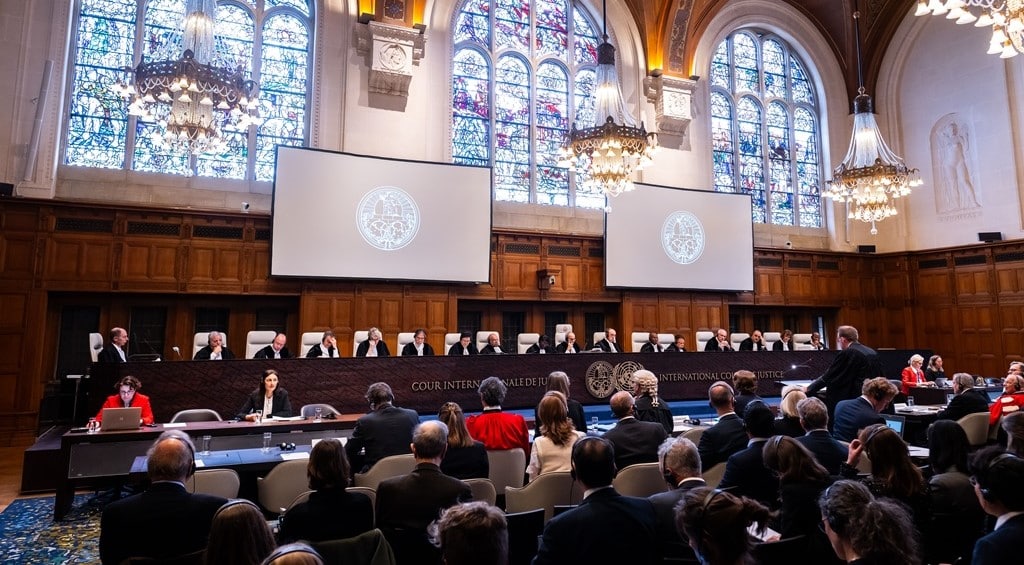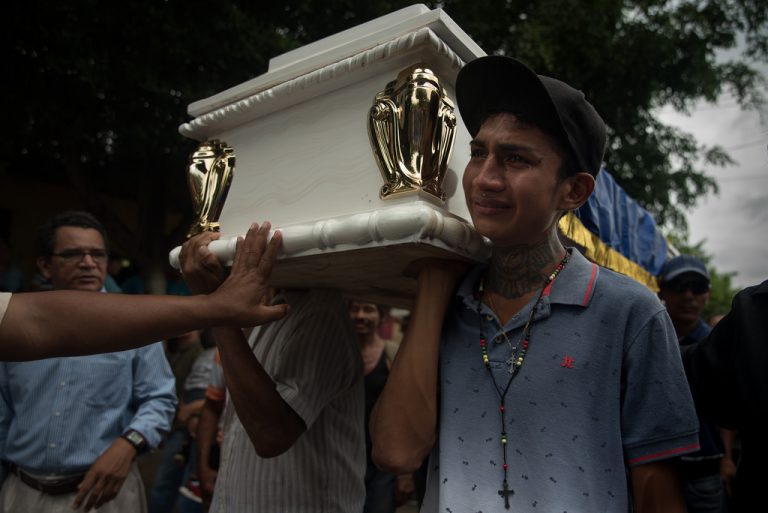12 de abril 2019

ICJ Rules Against Nicaragua's Request For Germany to Halt Arms Sales to Israel

PUBLICIDAD 1M
PUBLICIDAD 4D
PUBLICIDAD 5D
I returned to the desolate and long-suffering past of my youth, once again under a dictatorship, once again invincible in its rebellion.

I returned to the desolate and long-suffering past of my youth
For five years, from 2007 – 2012, I wrote a blog in El Nuevo Diario [Nicaraguan newspaper]. I wanted to create a kind of log book to record Daniel Ortega’s steps after his return to power. I feared what was going to happen. During the election campaign, I felt certain that if he succeeded in recovering the presidency, he would never leave it again, that he’d make use of any subterfuge to conserve it.
I wasn’t convinced by those who said that the way Nicaragua had evolved since 1990, prevented him from clinging to power. I stopped writing that blog in 2012, when I was overtaken by a depressing sensation of defeat, of impotence. Orteguismo, the system devised by Ortega, spread unstoppably: it steeped itself into the country’s consciousness, it poured down into all sectors of society like a corrosive oil for which there seemed to be no antidote.
I returned in 2013 to live permanently in Nicaragua, following a long period outside the country. I participated in the Group of 27, signed petitions and condemnations of government actions, attended marches to support women’s issues or joined the campesinos protesting over the canal project. I was dismayed to realize we were always the same at the rallies. We rarely managed a big turnout. In several interviews with the media, I called the Ortega government a “bland dictatorship”. I said these words because I had the impression they were not governing against the will of the majority, nor with the level of repression and violence that we lived through in Nicaragua with the Somoza dictatorships. Both big capital’s complacency with the regime, and the apathy, and indifference the young showed towards politics were puzzling to me.
Nevertheless, in 2016, the day of the presidential elections, when I drove around Managua to check if the level of abstention that was rumored was true, when I saw the voting centers empty, the sleepy streets like any other Sunday I began to harbor doubts about my pessimism.
That election was a clear signal of a disconnect between appearance and reality. Perhaps, I thought, Ortega had crossed the line of tolerance by running again for reelection, by stopping the PLI (the largest opposition party at this time) from running in the election, and by reviving the specter of another dynasty when with no scruples whatsoever he chose his wife as his running mate.
On April 2, 2018, I traveled from Nicaragua to Italy, where I had been invited to a poetry festival and later to spend a month in a residency for writers with a fellowship intended to give me time to write a screenplay based on my novel Waslala. I arrived at the residency on April 16. The mindset of spending a month concentrated on my work deserted me two days later.
Since April 18, Nicaragua, a nation seemingly bewitched by its vice president’s mellifluous sweet daily talk of love, Christianity and progress, opened up to reveal the disgust and discontent it had been accumulating. Possessed by a messianic zeal to prove themselves as the only ones who could lead Nicaraguans to the promised land, the Ortega Murillo had closed all the alternatives for change dismantling the alternative of free and fair elections. As if reaping what they had sowed they found themselves facing an unprecedented social explosion.
This time, the front rows of the protesters weren’t occupied by the well-known faces of the generation of the 70s and 80s; this time the faces were young, they were the faces of university students. Thanks to cellphone technology, like many more, I watched horrified the beating that the motorcycle thugs and veterans disguised as “Sandinista youth” administered to the first group that were protesting in Managua.
The method was like the repression in 2013 against the Occupy Social Security protest, but this time the abuse of force, the impassiveness of the police, happened in full daylight. The unmistakable videos of the barbarity went viral in minutes. Repudiation of such violence expanded in concentric circles. More students joined the protest. Shots were fired by the government. Twenty-three people were killed in the first days.
As in a horror film, we watched the young men and women barricading themselves into the universities, seeking refuge in the Cathedral from the ferocious riot squads. We saw teenager Alvarito Conrado begin to die on camera, unable to breathe. We saw a regime act without restrain or compassion.
Initially, Ortega’s calculation seemed to be that harsh punishment and fear would cut off the rebellion in one fell swoop. But it didn’t stop. The people’s fury grew, and the bullets increased.
Sixty-five people, mostly young students were dead when Ortega decided to cancel the reforms to the Social Security law and ask the Church to intercede in a dialogue. The rebellion had already extended across the whole country. The memory of the 1979 insurrection against another dictatorship had emerged. Barricades came up again Hundreds of roadblocks paralyzed the country.
A Charles Dickens quote comes to mind: “It was the worst of times; it was the best of times”. Clamoring for the dead a chorus rose up, it was the majority rejecting absolute power. Thousands marched through the streets wrapped in the white and blue colors of the Nicaraguan flag chanting “they must go”
Fear and indifference disappeared and gave way to the euphoria of freedom, the need to express what had been suppressed by will or even by convenience. . Ironically enacting the government slogan “people are the President”, people demanded the resignation of Ortega and Murillo.
Their response and that of some old Sandinista cronies hailed as heroes once upon a time surprised not only Nicaragua, but the world. In a few months, a generation that had never known violence confronted death, prison, torture, injuries, and the ungodly refusal to receive their wounded in the hospitals. Companera Rosario continued speaking vainly of love, but all the masks came off when the caravans of paramilitary entered the towns to kill.
It’s been said, and some of us have speculated that the protests against the forest fire at the Indio Maiz reserve, or against the reforms to Social Security wouldn’t have detonated such a strong popular response had it not been for the violence employed to repress them. But in the light of how much has happened, I think that the explosion would have occurred sooner or later.
Ortega and Murillo, arrogant and self-empowered had for long abandoned all pretense and prudence. Their blatant disregard for propriety of the legislative process was a game of appearances that didn’t fool anyone anymore. Forgetting their own history, they underestimated the intelligence and wisdom of Nicaraguans. With lights and fanfare, they had pretended to blind us only to end up blinding themselves. And so they acted, like blind furies striking out right and left, unleashing upon a people who never expected the level of cruelty and firepower that came their way, the most violent repression Latin America has seen in decades.
It’s been a year since that massacre, that “feat” some buffoons of the regime claim as a victory, and yet the witch hunt continues, and young people keep being detained and jailed without court order or due process. In a year, Ortega and Murillo squandered the remains of the anti-dictatorial Sandinista legacy and laid bare their pathological relation to personal power.
People watch, insist on their demands, insist on the liberation of hundreds of their kin who are still in prison, they accept to participate in talks, but the rulers refuse to confront the truth. They’re fearful, they take refuge in uniformed guards and weapons, they keep laboring to weave the nightmare they fear, and every day they rip and turn their humanity to shreds. From my journey to write in another country, I came back to the desolate and suffering country of my youth living under a dictatorship and embracing once again its unyielding rebellious spirit.
Thank you for reading our English section, brought to you in collaboration with Havana Times. If you wish to subscribe to our English Weekly Newsletter, you can do it here. Please spread the word and share this link with your friends, family or contacts.
Regards,
Archivado como:
PUBLICIDAD 3M
Poeta y novelista nicaragüense. Ha publicado quince libros de poemas, ocho novelas, dos libros de ensayos, una memoria, y cuatro cuentos para niños. Su primera novela “La mujer habitada” (1988) ha sido traducida a más de catorce idiomas. Ganadora del Premio La Otra Orilla, 2010; Biblioteca Breve, de Seix Barral (España, 2008); Premio Casa de las Américas, en Cuba; Premio Internacional de Poesía Generación del ‘27, en España y Premio Anna Seghers de la Academia de Artes, de Alemania; Premio de Bellas Artes de Francia, 2014. En 2023 obtuvo el premio Reina Sofía de Poesía Iberoamericana, el más prestigioso para la poesía en español. Por sus posiciones críticas al Gobierno de Daniel Ortega y Rosario Murillo, fue despatriada y confiscada. Está exiliada en Madrid.
PUBLICIDAD 3D